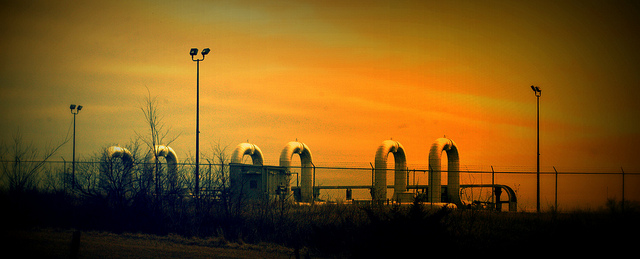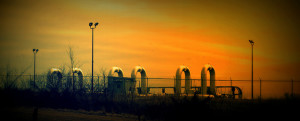The Political Motivations of Obama’s Rejection and Trudeau’s Support of Keystone XL
 Keystone Pumping Station, via Flickr CC https://flic.kr/p/dVnWU3
Keystone Pumping Station, via Flickr CC https://flic.kr/p/dVnWU3
On November 6, President Obama held a press conference in regards to the proposed Keystone XL pipeline. Stating that “the Keystone pipeline has occupied…an inflated role in our political discourse,” Obama rejected TransCanada’s proposal to begin construction, arguing that “the pipeline would not make a meaningful long term contribution to our economy” and “America is now a global leader when it comes to taking serious action to fight climate change… Today, we’re continuing to lead by example.”
The Keystone XL pipeline would be an extension to the already existing Keystone pipeline, otherwise known as phase IV. It would duplicate the already existing connection between Nebraska and Alberta, but over a more linear route and with a larger diameter pipe, allowing for a greater quantity of oil to be delivered to refineries at a faster rate. Phase I of the Keystone pipeline has the capacity to deliver oil at a rate of 435,000 barrels of oil a day, which was later increased to 591,000 barrels a day with phase II. Keystone XL would have the capacity to deliver 830,000 barrels of oil a day, a sizeable increase, especially when you consider that phases I through III of the already existing pipeline would continue to operate.
However, as Obama stated, the pipeline occupied an unusually large position within both Canadian and American political discourses. Argument raged back and forth on the economic and environmental impacts of the pipeline. TransCanada’s website has six pages of articles that detail the positive economic impact of the pipeline, including the creation of 14,400 person years of employment in Oklahoma and 13,000 new jobs during the construction of the pipeline, as well as 7,000 in related industries, making the inputs necessary for construction.
It is important to note that there is no distinction made between short and long term employment. It is undeniable that there will be a significant influx of money into areas where the pipeline is being constructed. However, it is unclear how much of that money and how many employment opportunities would remain after the project is completed.
A study conducted by Cornell University found that “based on the figures provided by TransCanada… the new permanent US pipeline jobs number at most 127.” This severely undercuts TransCanada’s claims, and calls into question the impact the pipeline would have on long term economic development. Additionally, a Globe and Mail article that examined the economic impact on Canadian employment found that only 2,200 jobs would be created, again without a distinction between long and short term employment.

The environmental concerns associated with the pipeline have been called into question as well. The US State Department report on the pipeline concluded that while the completion of the XL extension would increase overall greenhouse gas emissions, it would be a negligible increase on a global scale. The report goes on to say that the main environmental concern with the pipeline was its transportation of oil extracted from the Alberta oil sands, a process which releases more emissions than other extraction methods. However, such extraction would continue, according to the report, regardless of the pipeline’s construction as long as oil prices remained above $75 USD a barrel. The oil would simply move via rail or already existing pipelines. The report also found that the risk of oil spills with the XL pipeline would be significantly lower due to improved safety measures, citing the 2010 spill in the Kalamazoo River as an example of a learning experience.
Despite this, the rejection of the Keystone XL pipeline is still an environmental victory, if at best a symbolic one. According to President Obama, newly elected Prime Minister Justin Trudeau “expressed his disappointment” at the rejection of the proposal. Despite their differing positions on the project, their motivations for those respective positions are eerily similar. Obama did not reject the pipeline purely for environmental reasons, just as Trudeau does not support the pipeline for purely economic reasons.
Obama’s rejection of Keystone XL needs to be seen in the larger political context of the United States. 2016 is an election year, and the pipeline a partisan issue, with both Hillary Clinton and Bernie Sanders in opposition to the project and many notable Republicans, including Donald Trump and Paul Ryan, in staunch support of its completion.
Obama is attending the UN Conference on Climate Change in Paris and is seeking to position himself, the United States, and the Democratic Party as leaders in the global environmental movement. The rejection of the pipeline is a calculated political move to gain public support for his party, and keep the White House in Democratic hands. He took the opportunity during his press conference to reinforce his economic commitment as well, in order to maintain a balanced stance, stating that “Our businesses created 268,000 new jobs last month. They’ve created 13.5 million new jobs over the past 68 straight months—the longest streak on record. The unemployment rate fell to 5 percent. This Congress should pass a serious infrastructure plan, and keep those jobs coming.”
Trudeau’s motivations are eerily similar. In an interview with Evan Solomon, David Suzuki detailed a conversation that he had with the Liberal leader in regards to the party’s climate change policy, a conversation which ended with Trudeau dismissing Suzuki’s views as “sanctimonious crap” and Suzuki calling Trudeau a “twerp.” Despite the impressive vocabulary of the exchange, it is concerning that our newly elected Prime Minister was so abrasive and disrespectful towards arguably Canada’s leading expert on, or at least the premier spokesperson for, environmentalism and climate change policy.
Suzuki went on to explain that he said to Trudeau, “You’re for the development of the tar sands, you’re for the Keystone pipeline, but you’re against the Northern Gateway, you’re all over the damn map!” He further stated that “My feeling is that none of the parties except for the Greens is really taking [climate change] seriously.”
An investigation of Suzuki’s claims was fairly simple to do, and revealed what we already knew: Trudeau is a politician. He is seeking to curry favour in Alberta, a completely Conservative province in the recent election with the exception of two Liberal ridings. Trudeau knew that this would most likely be the case heading into the election: Calgary Heritage is, after all, Harper’s home riding. Further, Trudeau’s opposition to the Northern Gateway pipeline, a similar pipeline that would transport oil westward to be shipped overseas from British Columbia, reveals a startling and clear issue with Trudeau’s policies.
He has invited the Premiers of the provinces, as well as the party leaders of the major political parties in the House of Commons, to attend the UN Conference on Climate Change with him. He allowed federal scientists to speak freely to the media and public about their work and findings, whereas they had to seek departmental approval under Harper’s government. However, both of these actions are not a step forward, but instead a return to the status quo that existed before Harper. That is not to say that Trudeau shouldn’t have done so – by all means, it was the right thing to do – but allowing scientists to speak freely and bringing a large delegation to a UN conference does not herald an era of environmental conservationism and a movement towards preserving our planet.
This raises the question – will Trudeau do what he believes to be the best decision, or will he pursue what he believes will win him the next election? If his position on environmentalism can be swayed in certain instances in an attempt to win votes, can his position on other issues be changed as well? The general public knows that politicians seek to win votes, but the blatant politicking of majority leader Trudeau is worrisome, especially as the honeymoon period after his election wears off.
Only time will tell if Trudeau is a man of principle or a man of politics.
